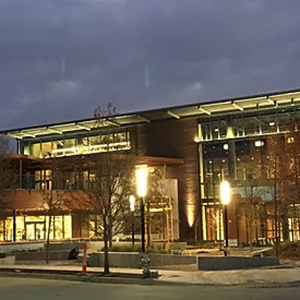 You’ve probably heard a lot about Focus First. You’ve likely taken part in its survey, focus groups, or both. Here’s an opportunity to learn more about the thought leader behind this process and how she is leading us toward collaborative discernment.
You’ve probably heard a lot about Focus First. You’ve likely taken part in its survey, focus groups, or both. Here’s an opportunity to learn more about the thought leader behind this process and how she is leading us toward collaborative discernment.
As we enter the final stages of the discernment and planning process known as Focus First to determine the direction and focus of our church for the next few years, Church Planning Consultant Susan Beaumont brings special knowledge, expertise, and experience to guide us toward the successful completion of this work. In her years of work with hundreds of congregations and denominational bodies across the United States and Canada, Susan is best known for her ground-breaking work in leadership dynamics of large congregations, helping her clients engage the best of business practices for growth and success, filtered through the lens of careful theological reflection.
As an ordained minister, Susan served as Senior Consultant with the Alban Institute before establishing her own private consulting practice. She has authored two books, Inside the Large Congregation and When Moses Meets Aaron: Staffing and Supervision in Large Congregations, which she co-authored with Gil Rendle, Senior Consultant with the Texas Methodist Foundation, as well as numerous articles on these topics closest to her heart.
As an educator, Susan has served on the faculty of two business schools, and she has taught graduate level courses in leadership, management, organizational behavior, human resources, and organizational development. She earned an MBA from Northwestern University, an M.Div. from McCormick Theological Seminary, and she is also a graduate of the Shalem Institute of Spiritual Guidance.
But that’s only part of who Susan Beaumont is — and what she brings to our First Church table. Susan says she entered this current 20-year phase of her career through something of a side door, following her “hobby” — a passion for helping churches — into a flourishing ministry. “I started doing this work with churches as sort of a sideline, a form of ministry,” she remembers. “It grew from there and started to take over my life, as ministry so often does, so I hit a conundrum for a while. I was not really sure what God had in mind for me, and then I had a clear call experience into full-time ministry in the church.”
So she hit the pause button on her corporate business career and went back to school for a divinity degree and became ordained. “Most of my divinity school work was on merging my corporate experience with what I was learning there,” she reflects. The initial challenge, she said, was trying to figure out what language to use to translate important business concepts and constructs into the work she wanted to do in church settings. She shrugs. “So now I’ve been doing this work for more than 20 years!”
And, judging by her track record of success with large churches coast to coast, she figured it out. This, she is the first to agree, was no small task. “Taking all the organizational stuff I learned in accounting, finance, and human resource management in corporate America and bringing that knowledge and expertise into the church through a theological lens meant not just trying to impose corporate practices on congregations, but to use my seminary training to synthesize all that — and to decide what parts belong and what parts do not belong.”
It’s no secret that large churches are an unusual hybrid of nonprofit organization, business, and a covenantal community. And, Susan notes, as effective as best practices in the business world may be for the business side, none of that corporate stuff captures the true covenant of a church — and that is the distinguishing feature she has found to be most important to address. “We try to model ourselves in the relationship we have with God, and that calls for different kinds of things,” she says. This, she adds, often creates confusion and can get complicated in ways no other business environment can. She laughs. “I once had a pastor come to me and say, ‘Can you tell me how to fire someone from my staff on Tuesday and bury his mother on Wednesday?’ That, I think, captures the essence of what we’re dealing with in churches.”
Undaunted — and even motivated — by this unique challenge of dealing with people and families and all the dynamics that go along with that while running an organization, Susan says, “That’s what makes this work so intriguing for me — it’s the most complex organization there is out there.”
Throughout all the churches and situations she’s encountered in her career as a church consultant, Susan says the most memorable experiences have one thing in common. “There’s very often a moment when there is a palpable Holy Spirit break through — a shift in the energy in the room — and everybody feels it,” she explains. “It doesn’t always happen,” she is quick to note, and that doesn’t mean the process wasn’t successful. “We set these things up, and then we try to be prayerful, we try to create space — and we try to be discerning, contemplative, and surrendering — turning ourselves toward God. And sometimes, there’s a single moment when we know that we just named something new: Something has just emerged here that is not of us. We recognize this not because the thing that emerged is so remarkable, but our shared sense that this is not of us.”
While Susan says she has no idea or way to predict when these moments may occur, she believes the most critical component throughout this process is our listening and our seeing and our “letting be.” The most important thing to know, Susan emphasizes, is that this process does not have a preconceived outcome — or an agenda that anyone brings into it. “The process is the agenda,” she emphasizes.
Susan says that what’s most intriguing to her — and one of the main reasons she said yes to being our consultant and guide in this process — is who this church is in this Greater Fort Worth community, the changing nature of this community, and the many different ways in which this community is thriving. “To be in the midst of something shifting in this way, and that there is an emergence and enough life in this congregation to capture it, well that’s just exciting to me,” she adds.
The key to taking advantage of this rare opportunity, Susan says, is being able to get alignment of energy. “The hardest thing for a church like that is alignment,” she explains. “Churches like this — we call them ‘big tent churches’ — are going to have to be more focused in the future. So for a ‘big tent’ church like FUMCFW, this is going to be quite a challenge. If we pick two or three things we want to do really well, what are we willing to let go of?”
Susan says that so far in her work with FUMCFW she has been especially delighted in the quality of our leadership. “It’s remarkable,” she adds. “I can put an idea vaguely out there, and someone will grab it and move it down the road. It’s a great group, and I already know that whatever emerges from this process will come from an authentic place of energy that the whole congregation can run with.”
 Read this story and more in CONNECT Magazine | 2018 Issue 1
Read this story and more in CONNECT Magazine | 2018 Issue 1
CONNECT Magazine is your source for the stories of our FUMCFW Faith Community — and how each fits in with our Healthy Plate Discipleship. Pick up your copy in the Main Office and Welcome Center or read it online.
CONNECT Magazine
